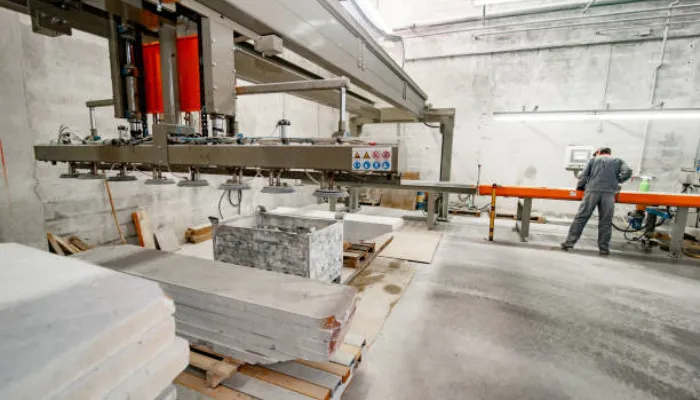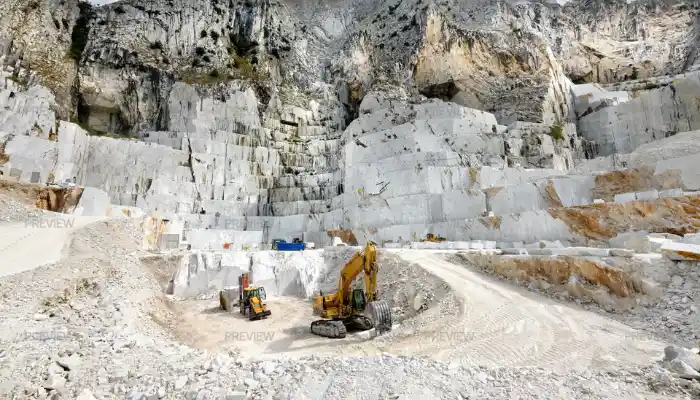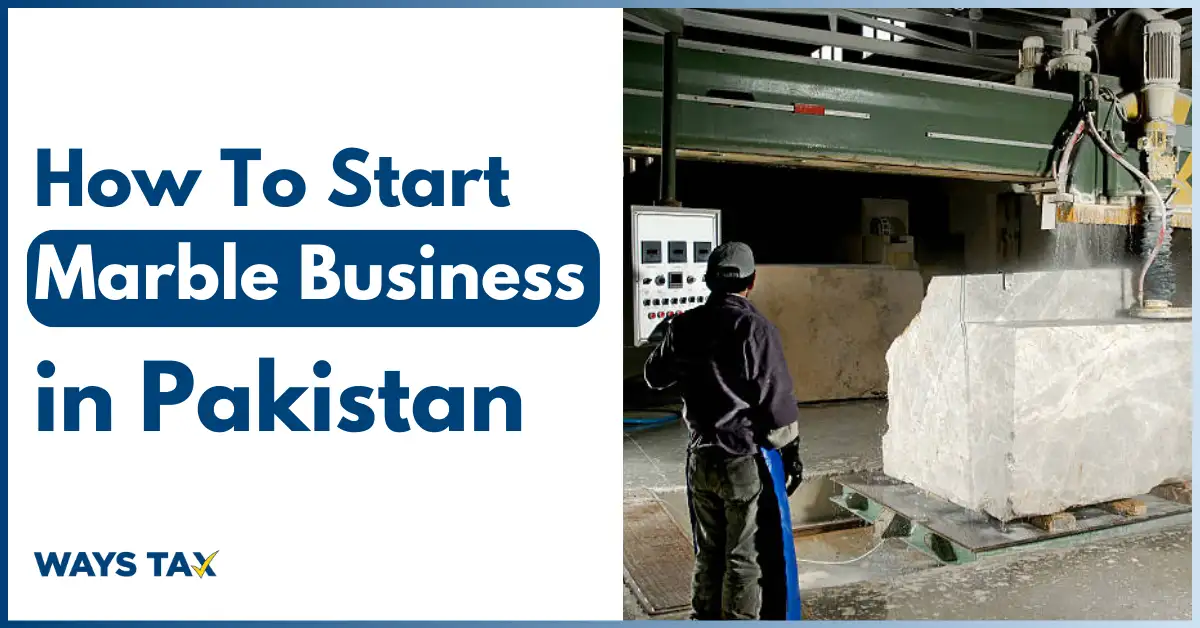How to Start a Marble Business in Pakistan – A Complete Guide
Ever wondered how the beautiful marble in luxury homes, mosques, and commercial buildings makes its way from the earth to polished floors and countertops?
Pakistan is home to some of the finest marble reserves in the world, making it a goldmine for entrepreneurs wondering how to start a marble business in Pakistan.
This guide breaks down everything you need to know, from business registration and investment costs to taxation and export opportunities, so you can launch and grow a successful marble business in Pakistan.
Start Your Marble Business the Right Way!
From company registration to tax compliance, we handle everything for you.

How to Start a Marble Business in Pakistan in 9 Steps
A marble business requires careful planning and proper approach towards the legal rules of the government.
Here are the necessary steps for establishing and operating a marble business.
1. Conduct Market Research and Feasibility Study
Before investing in a marble business, it is important to establish market demand, competition, and costs.
A feasibility study would therefore help determine whether the business is profitable at your location of choice.
- Identify Your Target Market: Do you target the local market, exports, or both?
- Analyze Competitors: Research marble businesses that exist in the market to determine prices and trends.
- Estimate Business Costs: Machinery, raw materials, labor, and marketing will all add up.
- Determine Profit Margins: Compare the cost estimates with the expected selling price to calculate the profitability.
2. Business Registration and Legal Requirements

To run a marble business legally in Pakistan, you need to register your business and get the necessary permits from the relevant authorities.
The registration process varies based on the business structure you select.
Choose a Business Structure
- Sole Proprietorship: Suitable for small-scale traders and retailers.
- Partnership (AOP): Ideal for joint ventures in marble mining or processing.
- Private Limited Company: Recommended for large-scale businesses with significant investment.
Register with SECP & FBR
- Register your business with the Securities and Exchange Commission of Pakistan (SECP).
- Get a National Tax Number (NTN) from the Federal Board of Revenue (FBR) to ensure legal compliance and taxation registration.
Obtain Industry-Specific Licenses
- If you’re involved in marble mining, you must obtain a Mining Lease and Exploration License from the Directorate of Mines and Minerals.
- Marble processing businesses need a Trade License from local authorities.
- Register with the Pakistan Stone Development Company (PASDEC) for industry support.
3. Selecting the Right Location for Your Business
Choosing the right location is essential for operational efficiency and cost reduction.
- For Marble Quarrying: Select a site near major marble reserves to minimize transportation costs.
- For Processing & Manufacturing: An industrial zone with access to electricity, water, and skilled labor is ideal.
- For Trading & Retailing: Set up a showroom in a construction hub like Karachi’s Timber Market, Lahore’s Hall Road, or Rawalpindi’s Marble Market.
Also, make sure your business location follows zoning regulations and environmental laws to avoid legal issues.
4. Purchasing Machinery and Equipment

The machinery you need depends on your business focus—mining, processing, or retailing—with each requiring specialized equipment for efficient operations.
Essential Equipment for a Marble Business:
- For Quarrying: Excavators, wire saws, drilling machines, loaders.
- For Processing: Cutting machines, polishing machines, CNC routers.
- For Trading: Forklifts, storage racks, and transportation vehicles.
Invest in modern machinery to boost efficiency, minimize waste, and enhance overall product quality in your marble business.
Pakistan also offers import duty exemptions on industrial equipment under various government schemes.
5. Investment and Financial Planning
A marble business requires substantial capital investment. The total cost depends on the scale and type of business.
Estimated Costs for a Marble Business
| Expense | Estimated Cost (PKR) |
| Quarry Lease | 5-10 million |
| Machinery & Equipment | 15-50 million |
| Processing Plant Setup | 20-100 million |
| Office & Warehouse | 2-5 million |
| Licensing & Registration | 0.5-2 million |
| Marketing & Branding | 1-3 million |
Funding Options
- Bank Loans: The State Bank of Pakistan (SBP) offers financing for marble businesses.
- Government Incentives: The SBP provides low-interest loans for industrial development.
- Investor Partnerships: Consider private investors for large-scale operations.
6. Taxation & Compliance for Marble Businesses
Proper tax compliance is crucial to avoid legal issues and maximize profits.
Tax Requirements for a Marble Business:
- Income Tax: Paid based on net profit, registered under FBR.
- Sales Tax: 17% General Sales Tax (GST) applies to marble products.
- Mining Royalties: If involved in quarrying, you must pay royalties to the government.
Customs Duties: Imported machinery is subject to customs taxes, but some exemptions are available.
Worried About Taxes and Compliance?
Avoid penalties and maximize profits with Ways Tax expert taxation services for marble businesses.

7. Marketing and Sales Strategy
To succeed in the marble business, you need an effective marketing strategy.
- Local Market Sales: Collaborate with construction firms and interior designers.
- Showroom & Online Presence: Showcase your products in a physical store or on an e-commerce website.
- Exporting Marble:
- Register with the Trade Development Authority of Pakistan (TDAP).
- Attend international stone expos to attract foreign buyers.
- Identify high-demand export markets such as UAE, China, Europe, and the USA.
8. Common Challenges and Solutions
Like any business, the marble industry comes with its own set of challenges, including
| Challenge | Solution |
| High Initial Investment | Seek bank financing or investor partnerships |
| Power Shortages | Install backup generators and solar power |
| Transportation Issues | Establish local distribution hubs |
| Environmental Regulations | Use eco-friendly mining techniques |
| Market Competition | Offer competitive pricing and high-quality products |
9. Trademark Registration for Marble Business
Registering a trademark protects your brand name, logo, and products, giving you exclusive rights and a competitive edge in the marble industry.
Steps to Register a Trademark in Pakistan:
- Trademark Search: Check IPO-Pakistan’s database for uniqueness.
- Application Submission: File with IPO-Pakistan under Class 19 (Building Materials).
- Publication & Approval: If no objections arise within two months, the trademark is approved.
- Certificate Issuance: Valid for 10 years, renewable.
Benefits of Trademark Registration
- Protects brand identity
- Prevents unauthorized use
- Enhances business credibility
Protect Your Marble Business with Waystax!
Secure your brand name, logo, and products with trademark registration. Waystax simplifies the process—ensuring compliance and exclusive rights.

Overview of the Marble Business in Pakistan
The marble industry in Pakistan is divided into three key sectors:
1. Marble Quarrying & Mining

This involves extracting raw marble from natural stone deposits.
Pakistan’s key marble-producing areas include Khyber Pakhtunkhwa (Swat, Buner), Balochistan (Chagai, Loralai), Sindh (Tharparkar), and Punjab (Rawalpindi, Gilgit-Baltistan).
2. Marble Processing & Manufacturing
Raw marble is processed into finished products like tiles, slabs, countertops, and decorative items using cutting and polishing machines.
3. Marble Trading & Retailing
This sector involves buying and selling finished marble products to local markets, construction firms, and international buyers.
Pakistan’s marble is highly valued in global markets, especially in China, the UAE, the USA, and Europe. The increasing demand for marble in real estate and infrastructure projects makes this an excellent business opportunity.
However, the industry also comes with challenges such as high machinery costs, energy shortages, and legal requirements.
How WaysTax.com Helps Businesses in Pakistan?
1. Company Registration Services
- Helps register Private Limited Companies (Pvt Ltd), Single Member Companies (SMC Pvt Ltd), and Limited Liability Partnerships (LLP).
Handle documentation and coordinate with the Securities and Exchange Commission of Pakistan (SECP) for business registration and compliance.
2. Taxation Services
- Assists in National Tax Number (NTN) registration for businesses and individuals.
- Handles e-filing of sales tax returns and tax compliance with FBR.
- Helps businesses maintain filer and active taxpayer status to avoid penalties.
3. Regulatory Compliance Support
- Provides Employee Old-Age Benefits Institution (EOBI) registration assistance.
- Helps businesses comply with property tax filings and other regulatory requirements.
Supports Karachi Chamber of Commerce and Industry (KCCI) registration.
FAQs
Final Thoughts
Now that you have learned how to start a marble business in Pakistan, it offers high investment potential, but success depends on careful planning, legal compliance, and strong financial management.
Whether you choose to enter mining, processing, or trading, understanding taxation and market trends is key to success.
For expert advice on business registration, taxation, and compliance, contact Ways Tax today!
Need Help with Business Registration?
Our experts at Ways Tax will guide you through the SECP, FBR, and mining license processes seamlessly.


